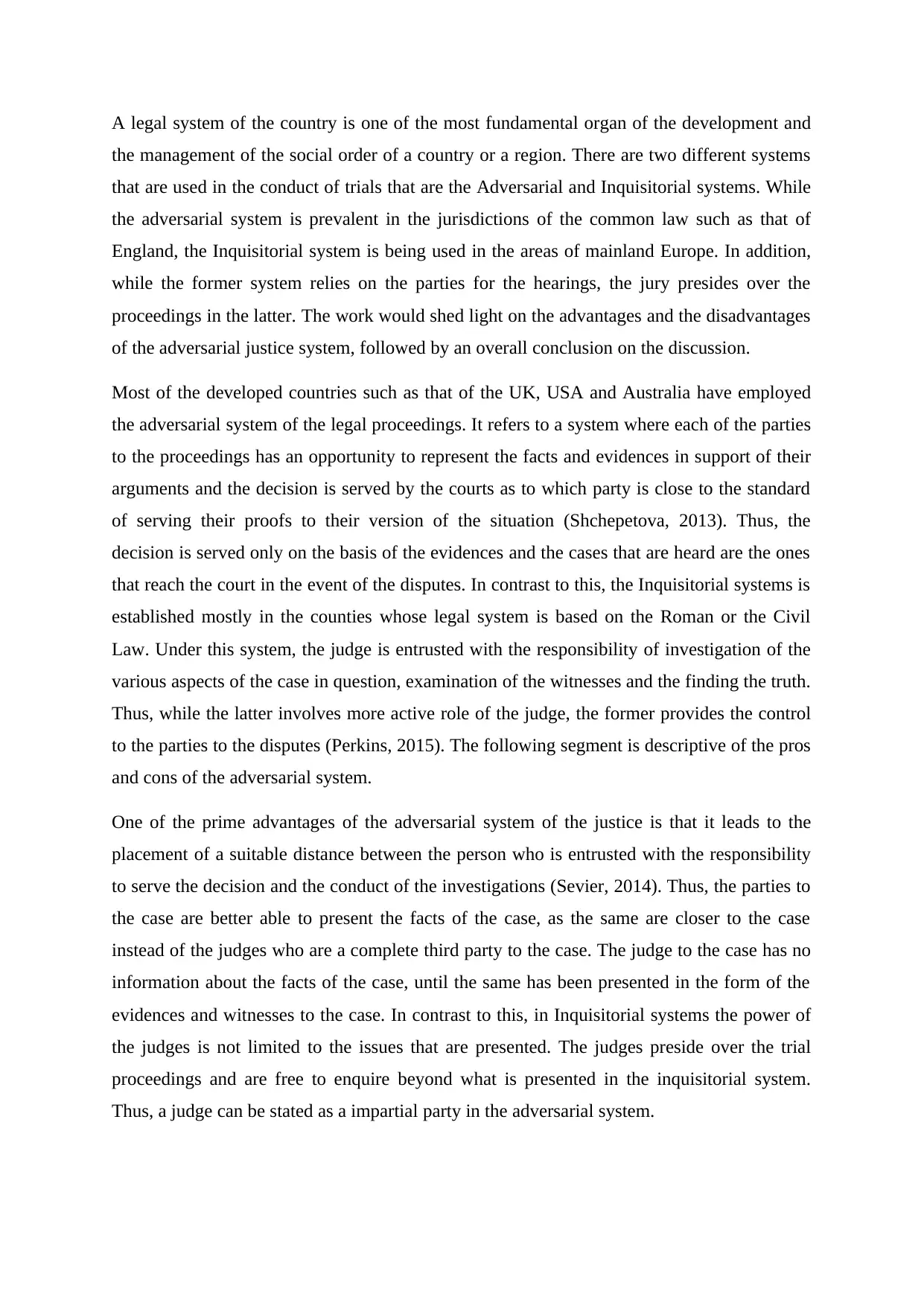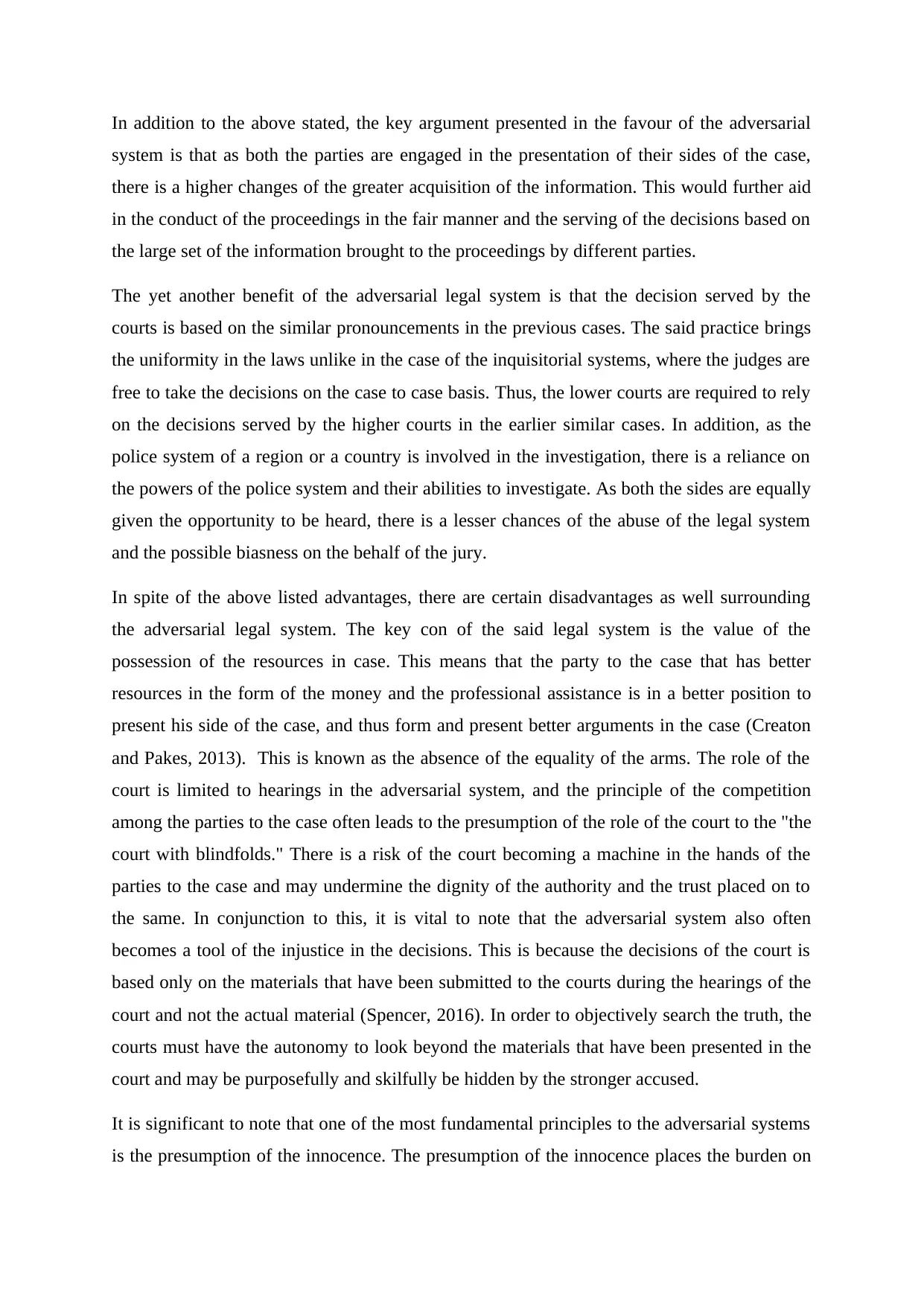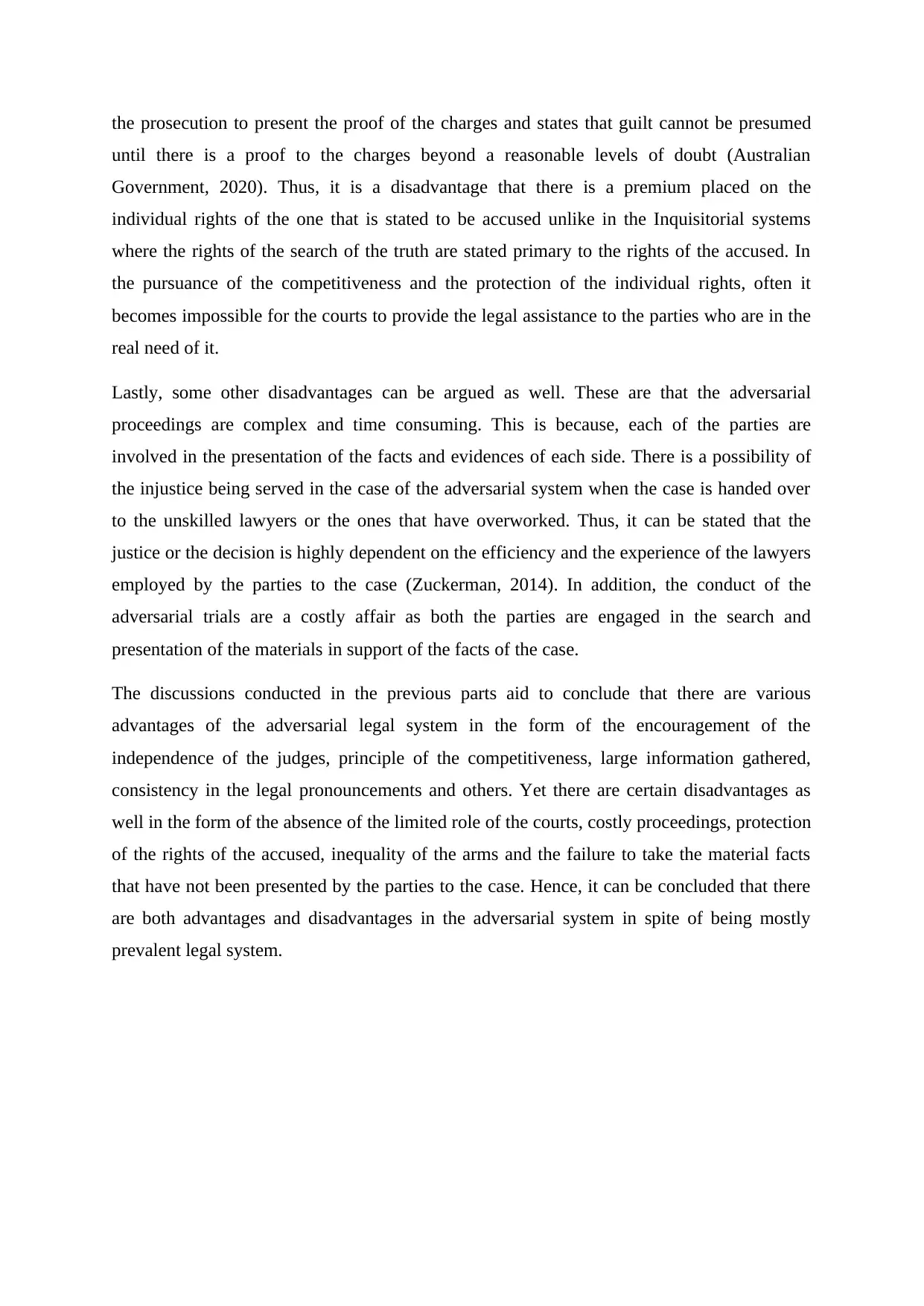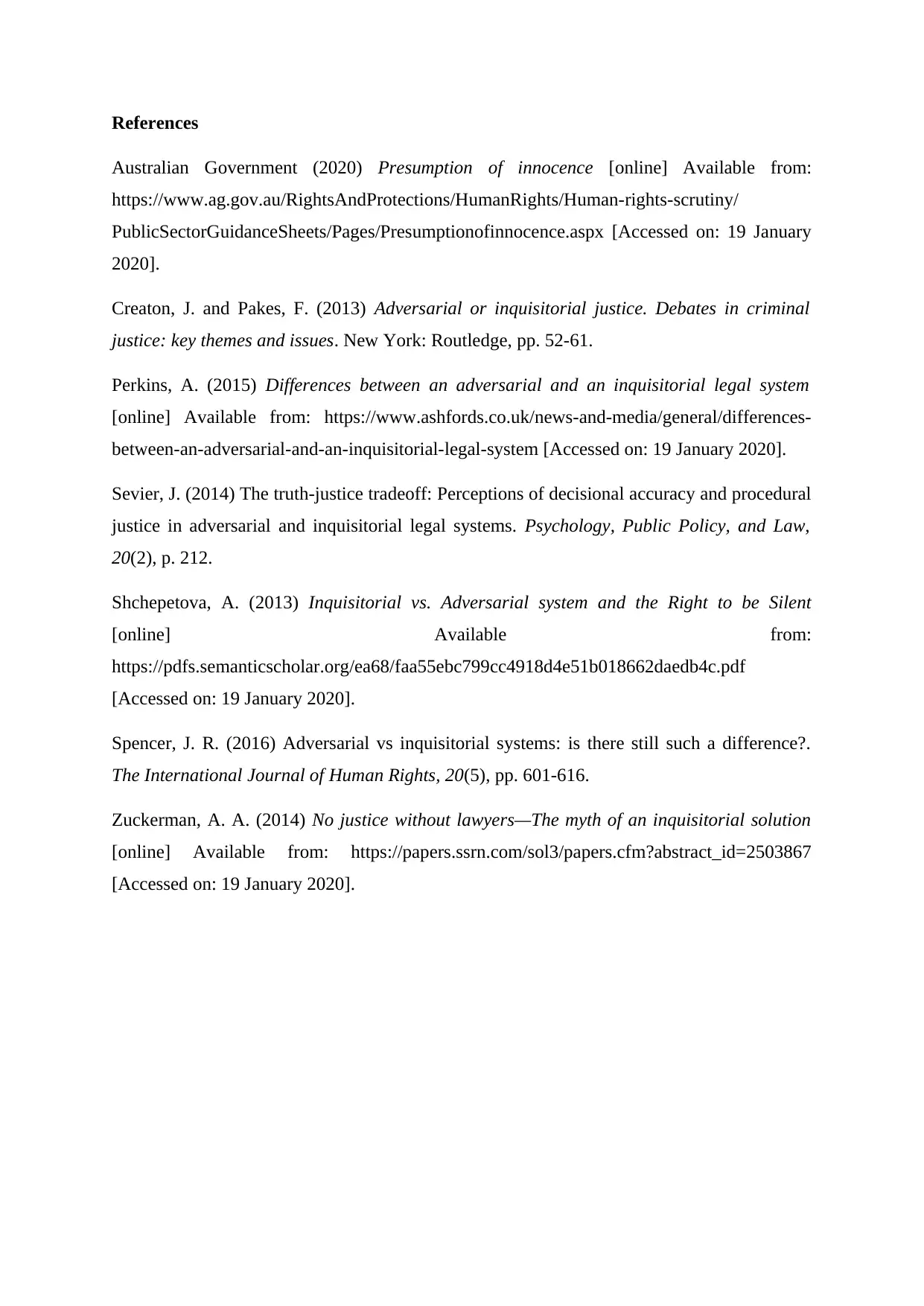Advantages and Disadvantages of the Adversarial Justice System in Law
VerifiedAdded on 2022/08/24
|5
|1763
|21
Essay
AI Summary
This essay provides a comprehensive overview of the adversarial system within the context of criminal justice. It begins by defining the adversarial system and contrasting it with the inquisitorial system, highlighting the key differences in trial conduct and the roles of the judge and parties involved. The essay then delves into the advantages of the adversarial system, such as the impartiality of the judge, the opportunity for both sides to present their arguments, and the reliance on precedent to ensure uniformity in the law. However, the essay also critically examines the disadvantages, including the potential for resource disparities, the limited role of the court, and the emphasis on individual rights over the search for truth. The essay concludes by acknowledging the prevalence of the adversarial system while recognizing its inherent strengths and weaknesses, emphasizing the need for a balanced approach to ensure fair and just legal proceedings. The essay also references key concepts like the presumption of innocence and the burden of proof, providing a thorough understanding of the system's core principles.

Introduction to criminal law and criminal justice
Paraphrase This Document
Need a fresh take? Get an instant paraphrase of this document with our AI Paraphraser

A legal system of the country is one of the most fundamental organ of the development and
the management of the social order of a country or a region. There are two different systems
that are used in the conduct of trials that are the Adversarial and Inquisitorial systems. While
the adversarial system is prevalent in the jurisdictions of the common law such as that of
England, the Inquisitorial system is being used in the areas of mainland Europe. In addition,
while the former system relies on the parties for the hearings, the jury presides over the
proceedings in the latter. The work would shed light on the advantages and the disadvantages
of the adversarial justice system, followed by an overall conclusion on the discussion.
Most of the developed countries such as that of the UK, USA and Australia have employed
the adversarial system of the legal proceedings. It refers to a system where each of the parties
to the proceedings has an opportunity to represent the facts and evidences in support of their
arguments and the decision is served by the courts as to which party is close to the standard
of serving their proofs to their version of the situation (Shchepetova, 2013). Thus, the
decision is served only on the basis of the evidences and the cases that are heard are the ones
that reach the court in the event of the disputes. In contrast to this, the Inquisitorial systems is
established mostly in the counties whose legal system is based on the Roman or the Civil
Law. Under this system, the judge is entrusted with the responsibility of investigation of the
various aspects of the case in question, examination of the witnesses and the finding the truth.
Thus, while the latter involves more active role of the judge, the former provides the control
to the parties to the disputes (Perkins, 2015). The following segment is descriptive of the pros
and cons of the adversarial system.
One of the prime advantages of the adversarial system of the justice is that it leads to the
placement of a suitable distance between the person who is entrusted with the responsibility
to serve the decision and the conduct of the investigations (Sevier, 2014). Thus, the parties to
the case are better able to present the facts of the case, as the same are closer to the case
instead of the judges who are a complete third party to the case. The judge to the case has no
information about the facts of the case, until the same has been presented in the form of the
evidences and witnesses to the case. In contrast to this, in Inquisitorial systems the power of
the judges is not limited to the issues that are presented. The judges preside over the trial
proceedings and are free to enquire beyond what is presented in the inquisitorial system.
Thus, a judge can be stated as a impartial party in the adversarial system.
the management of the social order of a country or a region. There are two different systems
that are used in the conduct of trials that are the Adversarial and Inquisitorial systems. While
the adversarial system is prevalent in the jurisdictions of the common law such as that of
England, the Inquisitorial system is being used in the areas of mainland Europe. In addition,
while the former system relies on the parties for the hearings, the jury presides over the
proceedings in the latter. The work would shed light on the advantages and the disadvantages
of the adversarial justice system, followed by an overall conclusion on the discussion.
Most of the developed countries such as that of the UK, USA and Australia have employed
the adversarial system of the legal proceedings. It refers to a system where each of the parties
to the proceedings has an opportunity to represent the facts and evidences in support of their
arguments and the decision is served by the courts as to which party is close to the standard
of serving their proofs to their version of the situation (Shchepetova, 2013). Thus, the
decision is served only on the basis of the evidences and the cases that are heard are the ones
that reach the court in the event of the disputes. In contrast to this, the Inquisitorial systems is
established mostly in the counties whose legal system is based on the Roman or the Civil
Law. Under this system, the judge is entrusted with the responsibility of investigation of the
various aspects of the case in question, examination of the witnesses and the finding the truth.
Thus, while the latter involves more active role of the judge, the former provides the control
to the parties to the disputes (Perkins, 2015). The following segment is descriptive of the pros
and cons of the adversarial system.
One of the prime advantages of the adversarial system of the justice is that it leads to the
placement of a suitable distance between the person who is entrusted with the responsibility
to serve the decision and the conduct of the investigations (Sevier, 2014). Thus, the parties to
the case are better able to present the facts of the case, as the same are closer to the case
instead of the judges who are a complete third party to the case. The judge to the case has no
information about the facts of the case, until the same has been presented in the form of the
evidences and witnesses to the case. In contrast to this, in Inquisitorial systems the power of
the judges is not limited to the issues that are presented. The judges preside over the trial
proceedings and are free to enquire beyond what is presented in the inquisitorial system.
Thus, a judge can be stated as a impartial party in the adversarial system.

In addition to the above stated, the key argument presented in the favour of the adversarial
system is that as both the parties are engaged in the presentation of their sides of the case,
there is a higher changes of the greater acquisition of the information. This would further aid
in the conduct of the proceedings in the fair manner and the serving of the decisions based on
the large set of the information brought to the proceedings by different parties.
The yet another benefit of the adversarial legal system is that the decision served by the
courts is based on the similar pronouncements in the previous cases. The said practice brings
the uniformity in the laws unlike in the case of the inquisitorial systems, where the judges are
free to take the decisions on the case to case basis. Thus, the lower courts are required to rely
on the decisions served by the higher courts in the earlier similar cases. In addition, as the
police system of a region or a country is involved in the investigation, there is a reliance on
the powers of the police system and their abilities to investigate. As both the sides are equally
given the opportunity to be heard, there is a lesser chances of the abuse of the legal system
and the possible biasness on the behalf of the jury.
In spite of the above listed advantages, there are certain disadvantages as well surrounding
the adversarial legal system. The key con of the said legal system is the value of the
possession of the resources in case. This means that the party to the case that has better
resources in the form of the money and the professional assistance is in a better position to
present his side of the case, and thus form and present better arguments in the case (Creaton
and Pakes, 2013). This is known as the absence of the equality of the arms. The role of the
court is limited to hearings in the adversarial system, and the principle of the competition
among the parties to the case often leads to the presumption of the role of the court to the "the
court with blindfolds." There is a risk of the court becoming a machine in the hands of the
parties to the case and may undermine the dignity of the authority and the trust placed on to
the same. In conjunction to this, it is vital to note that the adversarial system also often
becomes a tool of the injustice in the decisions. This is because the decisions of the court is
based only on the materials that have been submitted to the courts during the hearings of the
court and not the actual material (Spencer, 2016). In order to objectively search the truth, the
courts must have the autonomy to look beyond the materials that have been presented in the
court and may be purposefully and skilfully be hidden by the stronger accused.
It is significant to note that one of the most fundamental principles to the adversarial systems
is the presumption of the innocence. The presumption of the innocence places the burden on
system is that as both the parties are engaged in the presentation of their sides of the case,
there is a higher changes of the greater acquisition of the information. This would further aid
in the conduct of the proceedings in the fair manner and the serving of the decisions based on
the large set of the information brought to the proceedings by different parties.
The yet another benefit of the adversarial legal system is that the decision served by the
courts is based on the similar pronouncements in the previous cases. The said practice brings
the uniformity in the laws unlike in the case of the inquisitorial systems, where the judges are
free to take the decisions on the case to case basis. Thus, the lower courts are required to rely
on the decisions served by the higher courts in the earlier similar cases. In addition, as the
police system of a region or a country is involved in the investigation, there is a reliance on
the powers of the police system and their abilities to investigate. As both the sides are equally
given the opportunity to be heard, there is a lesser chances of the abuse of the legal system
and the possible biasness on the behalf of the jury.
In spite of the above listed advantages, there are certain disadvantages as well surrounding
the adversarial legal system. The key con of the said legal system is the value of the
possession of the resources in case. This means that the party to the case that has better
resources in the form of the money and the professional assistance is in a better position to
present his side of the case, and thus form and present better arguments in the case (Creaton
and Pakes, 2013). This is known as the absence of the equality of the arms. The role of the
court is limited to hearings in the adversarial system, and the principle of the competition
among the parties to the case often leads to the presumption of the role of the court to the "the
court with blindfolds." There is a risk of the court becoming a machine in the hands of the
parties to the case and may undermine the dignity of the authority and the trust placed on to
the same. In conjunction to this, it is vital to note that the adversarial system also often
becomes a tool of the injustice in the decisions. This is because the decisions of the court is
based only on the materials that have been submitted to the courts during the hearings of the
court and not the actual material (Spencer, 2016). In order to objectively search the truth, the
courts must have the autonomy to look beyond the materials that have been presented in the
court and may be purposefully and skilfully be hidden by the stronger accused.
It is significant to note that one of the most fundamental principles to the adversarial systems
is the presumption of the innocence. The presumption of the innocence places the burden on
⊘ This is a preview!⊘
Do you want full access?
Subscribe today to unlock all pages.

Trusted by 1+ million students worldwide

the prosecution to present the proof of the charges and states that guilt cannot be presumed
until there is a proof to the charges beyond a reasonable levels of doubt (Australian
Government, 2020). Thus, it is a disadvantage that there is a premium placed on the
individual rights of the one that is stated to be accused unlike in the Inquisitorial systems
where the rights of the search of the truth are stated primary to the rights of the accused. In
the pursuance of the competitiveness and the protection of the individual rights, often it
becomes impossible for the courts to provide the legal assistance to the parties who are in the
real need of it.
Lastly, some other disadvantages can be argued as well. These are that the adversarial
proceedings are complex and time consuming. This is because, each of the parties are
involved in the presentation of the facts and evidences of each side. There is a possibility of
the injustice being served in the case of the adversarial system when the case is handed over
to the unskilled lawyers or the ones that have overworked. Thus, it can be stated that the
justice or the decision is highly dependent on the efficiency and the experience of the lawyers
employed by the parties to the case (Zuckerman, 2014). In addition, the conduct of the
adversarial trials are a costly affair as both the parties are engaged in the search and
presentation of the materials in support of the facts of the case.
The discussions conducted in the previous parts aid to conclude that there are various
advantages of the adversarial legal system in the form of the encouragement of the
independence of the judges, principle of the competitiveness, large information gathered,
consistency in the legal pronouncements and others. Yet there are certain disadvantages as
well in the form of the absence of the limited role of the courts, costly proceedings, protection
of the rights of the accused, inequality of the arms and the failure to take the material facts
that have not been presented by the parties to the case. Hence, it can be concluded that there
are both advantages and disadvantages in the adversarial system in spite of being mostly
prevalent legal system.
until there is a proof to the charges beyond a reasonable levels of doubt (Australian
Government, 2020). Thus, it is a disadvantage that there is a premium placed on the
individual rights of the one that is stated to be accused unlike in the Inquisitorial systems
where the rights of the search of the truth are stated primary to the rights of the accused. In
the pursuance of the competitiveness and the protection of the individual rights, often it
becomes impossible for the courts to provide the legal assistance to the parties who are in the
real need of it.
Lastly, some other disadvantages can be argued as well. These are that the adversarial
proceedings are complex and time consuming. This is because, each of the parties are
involved in the presentation of the facts and evidences of each side. There is a possibility of
the injustice being served in the case of the adversarial system when the case is handed over
to the unskilled lawyers or the ones that have overworked. Thus, it can be stated that the
justice or the decision is highly dependent on the efficiency and the experience of the lawyers
employed by the parties to the case (Zuckerman, 2014). In addition, the conduct of the
adversarial trials are a costly affair as both the parties are engaged in the search and
presentation of the materials in support of the facts of the case.
The discussions conducted in the previous parts aid to conclude that there are various
advantages of the adversarial legal system in the form of the encouragement of the
independence of the judges, principle of the competitiveness, large information gathered,
consistency in the legal pronouncements and others. Yet there are certain disadvantages as
well in the form of the absence of the limited role of the courts, costly proceedings, protection
of the rights of the accused, inequality of the arms and the failure to take the material facts
that have not been presented by the parties to the case. Hence, it can be concluded that there
are both advantages and disadvantages in the adversarial system in spite of being mostly
prevalent legal system.
Paraphrase This Document
Need a fresh take? Get an instant paraphrase of this document with our AI Paraphraser

References
Australian Government (2020) Presumption of innocence [online] Available from:
https://www.ag.gov.au/RightsAndProtections/HumanRights/Human-rights-scrutiny/
PublicSectorGuidanceSheets/Pages/Presumptionofinnocence.aspx [Accessed on: 19 January
2020].
Creaton, J. and Pakes, F. (2013) Adversarial or inquisitorial justice. Debates in criminal
justice: key themes and issues. New York: Routledge, pp. 52-61.
Perkins, A. (2015) Differences between an adversarial and an inquisitorial legal system
[online] Available from: https://www.ashfords.co.uk/news-and-media/general/differences-
between-an-adversarial-and-an-inquisitorial-legal-system [Accessed on: 19 January 2020].
Sevier, J. (2014) The truth-justice tradeoff: Perceptions of decisional accuracy and procedural
justice in adversarial and inquisitorial legal systems. Psychology, Public Policy, and Law,
20(2), p. 212.
Shchepetova, A. (2013) Inquisitorial vs. Adversarial system and the Right to be Silent
[online] Available from:
https://pdfs.semanticscholar.org/ea68/faa55ebc799cc4918d4e51b018662daedb4c.pdf
[Accessed on: 19 January 2020].
Spencer, J. R. (2016) Adversarial vs inquisitorial systems: is there still such a difference?.
The International Journal of Human Rights, 20(5), pp. 601-616.
Zuckerman, A. A. (2014) No justice without lawyers—The myth of an inquisitorial solution
[online] Available from: https://papers.ssrn.com/sol3/papers.cfm?abstract_id=2503867
[Accessed on: 19 January 2020].
Australian Government (2020) Presumption of innocence [online] Available from:
https://www.ag.gov.au/RightsAndProtections/HumanRights/Human-rights-scrutiny/
PublicSectorGuidanceSheets/Pages/Presumptionofinnocence.aspx [Accessed on: 19 January
2020].
Creaton, J. and Pakes, F. (2013) Adversarial or inquisitorial justice. Debates in criminal
justice: key themes and issues. New York: Routledge, pp. 52-61.
Perkins, A. (2015) Differences between an adversarial and an inquisitorial legal system
[online] Available from: https://www.ashfords.co.uk/news-and-media/general/differences-
between-an-adversarial-and-an-inquisitorial-legal-system [Accessed on: 19 January 2020].
Sevier, J. (2014) The truth-justice tradeoff: Perceptions of decisional accuracy and procedural
justice in adversarial and inquisitorial legal systems. Psychology, Public Policy, and Law,
20(2), p. 212.
Shchepetova, A. (2013) Inquisitorial vs. Adversarial system and the Right to be Silent
[online] Available from:
https://pdfs.semanticscholar.org/ea68/faa55ebc799cc4918d4e51b018662daedb4c.pdf
[Accessed on: 19 January 2020].
Spencer, J. R. (2016) Adversarial vs inquisitorial systems: is there still such a difference?.
The International Journal of Human Rights, 20(5), pp. 601-616.
Zuckerman, A. A. (2014) No justice without lawyers—The myth of an inquisitorial solution
[online] Available from: https://papers.ssrn.com/sol3/papers.cfm?abstract_id=2503867
[Accessed on: 19 January 2020].
1 out of 5
Related Documents
Your All-in-One AI-Powered Toolkit for Academic Success.
+13062052269
info@desklib.com
Available 24*7 on WhatsApp / Email
![[object Object]](/_next/static/media/star-bottom.7253800d.svg)
Unlock your academic potential
Copyright © 2020–2026 A2Z Services. All Rights Reserved. Developed and managed by ZUCOL.




